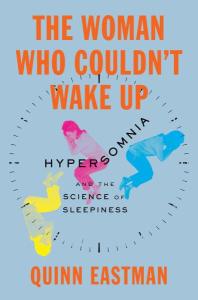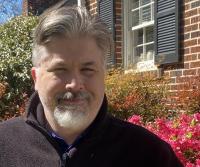
Quinn Eastman—The Woman Who Couldn't Wake Up: Hypersomnia and the Science of Sleepiness
HYPERSOMNIA AND THE SCIENCE OF SLEEPINESS
Quinn Eastman
Columbia University Press, August 1, 2023, $32
ISBN-10: 0231194641, ISBN-13: 978-0231194648
ASIN: B0C15PHWN1
Eastman reports:
This book grew out of my experience watching the coalescence of a community. Until about a decade ago, people diagnosed with the sleep disorder idiopathic hypersomnia didn’t have support groups or organizations that could advocate for them. Idiopathic hypersomnia was the “shadow sibling” of narcolepsy, a better known disorder that causes severe and persistent drowsiness.
As a university PIO, I had been covering research that helped one woman—and later a small group—manage extreme sleepiness when conventional medications hadn’t done the job. That research was intriguing, and the investigators behind it had swagger, but they ran into controversy. Rivals had tried and failed to replicate their results. As I learned more about idiopathic hypersomnia’s history, it struck me that this tangled mess might contain a book.
In 2017, I began assembling a proposal. The point when I had to decide whether to travel overseas for a sleep research meeting was when I really committed to the project. An editor at an Atlanta writers’ conference connected me with an agent. After some misfires, Columbia University Press was willing to take me on, and their support helped me obtain a grant from the Alfred P. Sloan Foundation. The Sloan grant enabled me to hire an illustrator and fact-checkers and to take a few months leave from my job. My leave coincided with the beginning of the COVID-19 pandemic, which limited travel and interviews.When I started back in 2017, I did not know what the end of the story would be. In my perhaps overly ambitious proposal, I conceived of the book as a detective story. I thought I’d explore the mysteries of sleep and sprinkle in some history. But the detective case turned cold, and I hadn’t appreciated how extensive the mysteries were. Given the lack of resolution for the scientific narrative, I reshaped and cut peripheral material to emphasize the positive outcome: community formation. The story shifted from one woman’s struggle, which was resolved, to larger issues.
Contact info:
- Quinn Eastman, 760-445-7571, quinneastman@gmail.com, https://www.quinneastman.com/, @qeastman
- Book: The Woman Who Couldn’t Wake Up
- Publicist: Robyn Massey, 212-459-0600, rm3785@columbia.edu
- Agent: Jessica Papin, 212-617-9100, jpapin@dystel.com
NASW members: will your book be published soon? Promote it by submitting your report for Advance Copy.
Tell your fellow NASW members how you came up with the idea for your book, developed a proposal, found an agent and publisher, funded and conducted research, and put the book together. Include what you wish you had known before you began working on your book, or had done differently.
See https://www.nasw.org/advance-copy-submission-guidelines.
View Advance Copy archives at https://www.nasw.org/member-article/advance-copy.
Thinking of writing a book? If you are a NASW member, you may access a list of more than 200 books and online resources to help you craft your book proposal, find an agent and funding sources, negotiate your contract, learn about self-publishing, publicize and market your book, and more at https://www.nasw.org/article/write-book.
Send book info and questions about book publishing to Lynne Lamberg, NASW book editor, llamberg@nasw.org.
Follow @LynneLamberg on Twitter for news about science/medical books, writing, and NASW authors.
Banner image adapted from original photo by Quinn Eastman.
NASW members: Share photos of your office bookshelves for use on our website. Upload photos to bit.ly/naswpicsubmit.
NASW invites publishers and publicists to purchase NASW website ads to promote their authors and books. Visit https://www.nasw.org/node/add/ad to access NASW’s self-service purchasing portal.
Advance Copy
The path from idea to book may take myriad routes. The Advance Copy column, started in 2000 by NASW volunteer book editor Lynne Lamberg, features NASW authors telling the stories behind their books. Authors are asked to report how they got their idea, honed it into a proposal, found an agent and a publisher, funded and conducted their research, and organized their writing process. They also are asked to share what they wish they’d known when they started or would do differently next time, and what advice they can offer aspiring authors. Lamberg edits the authors’ answers to produce the Advance Copy reports.
NASW members: Will your book be published soon? Visit www.nasw.org/advance-copy-submission-guidelines for information on submitting your report.
Publication of NASW author reports in Advance Copy does not constitute NASW's endorsement of any publication or the ideas, values, or material contained within or espoused by authors or their books. We hope this column stimulates productive discussions on important topics now and in the future as both science and societies progress. We welcome your discussion in the comments section below.





